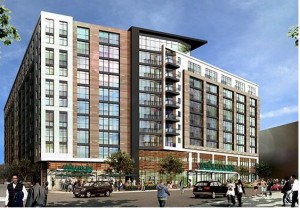 Legislation proposed by the DC Council would help ensure that residents and policymakers get a full financial picture when the city sells land at a discounted rate in return for getting affordable housing built there. A law adopted last year is already turning city-owned land into much-needed mixed-income housing. Greater financial transparency will help show how these deals work and strengthen this important new housing tool.
Legislation proposed by the DC Council would help ensure that residents and policymakers get a full financial picture when the city sells land at a discounted rate in return for getting affordable housing built there. A law adopted last year is already turning city-owned land into much-needed mixed-income housing. Greater financial transparency will help show how these deals work and strengthen this important new housing tool.
Land owned by the District is now producing affordable housing, thanks to a law passed last year. When DC land is sold for residential development, the Disposition of District Land for Affordable Housing Act requires up to 30 percent of the new units to be affordable to low- and moderate-income families. In these deals, the city sells the land for less than full market value to offset the cost of affordable rents. In effect, the land value — rather than tax dollars — pays for the affordable housing.
Thanks to the law, a new development at 965 Florida Avenue NW will have over 100 affordable apartments. Those apartments, which will be affordable for the life of the building, will be close to Metro, jobs, and neighborhood amenities. With low-cost private housing virtually non-existent in the District, we need more projects like this to ensure that all DC residents have a decent, affordable place to live.
It is important that the public and the Council understand how these kinds of deals are financed, because they are complex and result in the city selling its land at a very discounted rate. We testified in support of a bill intended to ensure that the District provides clear information on how much a piece of land being disposed of is worth — its full market value — and how affordable housing and other requirements result in lowering the sales price. Full transparency in public land dispositions will strengthen this key tool for producing affordable housing.
The Council is also considering a bill that would extend these kinds of affordability requirements to when the District closes a street or alley for a residential development. We support this bill, though we recognize there are some complexities that will need to be worked out. For example, land, streets, and alleys are public assets. When they’re made part of a private development, it makes sense to be sure the development provides some of the affordable housing that District residents urgently need.
To print a copy of today’s blog, click here.
